Displaced: Residents Struggle To Find New Home After Shasha Clash In Oyo State
Some of the former Shasha residents have moved to Iroko, also in Akinyele Local Government Area of Oyo State, Southwest Nigeria.
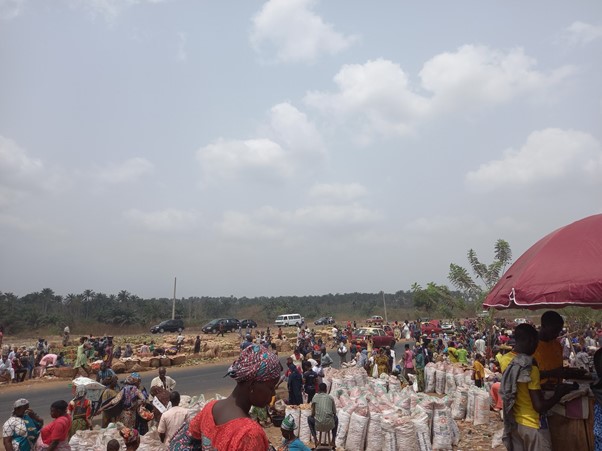
When Muhammed Aliyu found the strength to tell his story, he was sitting on a torn carton under a palm tree that did little to provide cover from the scorching sun. His face wore a weary look as he settled to narrate how he had survived the last few days.
Born and bred in Shasha community, Oyo State, Southwest Nigeria, Aliyu, his wife, and three children – Abdullahi, Aminah, and Aisha – lived comfortably in his father’s house not far from his tomato shop at Shasha market.
He had a routine life that he and his family found comfortable. Unfortunately, on Feb. 11 2021, life as he knew it crashed before his eyes.
In the heat of the clash between Hausa and Yoruba residents in the community, Aliyu’s shop, alongside several others, got burnt.
Even though his father’s house, built in 1984, is still standing after the clash as his Yoruba neighbours defended it. He said it is a no go area for him.
“I live here. I sleep here now,” Aliyu repeatedly said as though he was still trying to accept it himself. The ‘here’ Aliyu was referring to is a large expanse of land along the Ibadan-Oyo expressway.
Following the violent clash, which lasted for two days, Hausa residents in the community relocated to Sabo and Ojoo communities in Ibadan. A few days later, some of them decided to create a new settlement at Iroko, a town located about 30 kilometres from the outskirts of Ibadan.

While some live with friends or relatives at Sabo and Ojoo, others numbering “about 2,000” and Aliyu reside on paper cartons on the large expanse of land just beside the expressway.
“We sleep in this field. No shelter, no nothing. It’s just this field. But it is safer for us to sleep here and do our businesses here rather than go back to Shasha.”
“In the morning, we cross to the other side of the express. There is a river deep inside. We go there to bathe, and some don’t. But we are comfortable with it because we know with time, this place will be developing,” Aliyu told HumAngle.
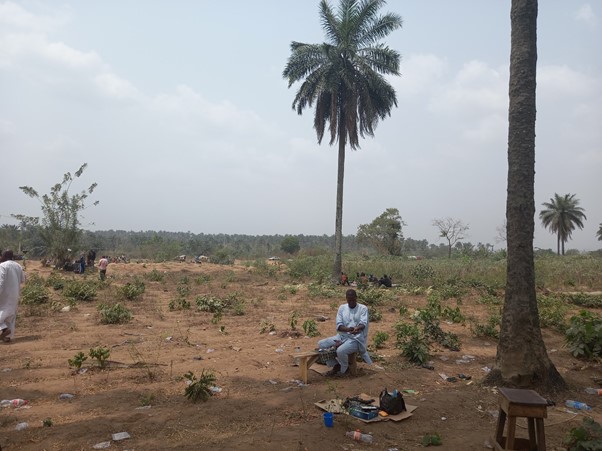
“We have some good people that are helping us with clothing, like our Hausa people living around Ojoo, Mokola, and if you have change in your pocket, you will buy clothes and wear,” Aliyu said.
With no food, cloth, or stable shelter, Aliyu had to send his wife and children to Sokoto State. Aliyu’s response to whether he will return to Shasha was to reel out the names of his relatives and close associates who lost their lives in the clash.
Providing more insight into why he would not return to Shasha, Aliyu explained that when he heard northern governors were visiting the community and there was a guarantee of heavy security presence, he went to his father’s house to pick up some clothes.
“On my way out, I heard the governors had left, and masses of people have returned to the community. I was very shocked. On getting out of the area, thugs attacked me, and that is our main fear. When they attacked me, I had to bail myself out by giving them N10,000,” Aliyu narrated painfully.
Abubakar Hussain, a father of two, had his back on a palm tree when this HumAngle reporter met him. He was dressed in a fairly-used blue shirt he bought from a Hausa trader for N400 a day before.
“Never,” Hussain said with a heightened voice when asked if he will return to Shasha, where he was born and raised.
Hussain, who currently squats with one of his relatives at Akinyele Local Government Area and now trades at Iroko, said he prefers his new lifestyle over returning to Shasha community, where he lived and worked before the clash.
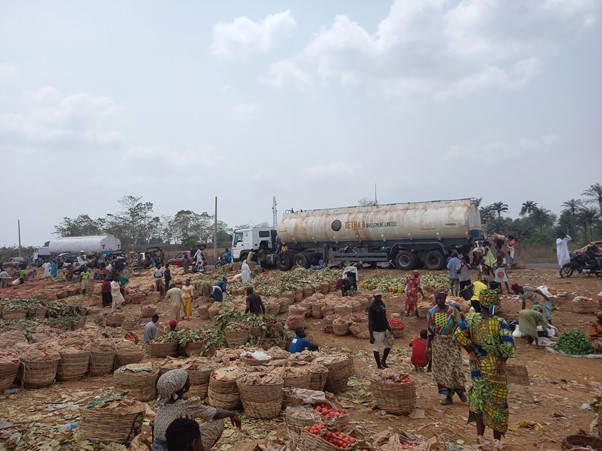
Aliyu and Hussain, like several traders and residents of Shasha who have vowed never to return after the clash, continue to struggle for survival in various ways. Their tales have one thing in common – the government’s neglect.
“We have received no help or support from the government,” Aliyu noted.
They could not benefit from the money donated by northern governors because they could not go back to Shasha, where the donation was made. “We are just here, and God is with us,” he added. Hussain and some others feel the same way.
“The government did not give us anything. No money, no cloth, no food. They just left us anyhow,” Hussain told HumAngle.
At Sabo, a predominantly Hausa community where some former residents of Shasha relocated, the tale was similar.
“I now stay with my friend. He gave me clothes, food, and accommodation,” Abubakar Shuaib, who lived and worked in Shasha before the clash, told HumAngle.
Shuaib, who now lives with his friend in a single room, also vowed never to return to Shasha.
Despite losing everything he had, Shuaib and others who relocated told HumAngle that the government had made no effort to identify their needs in the face of their current plight.
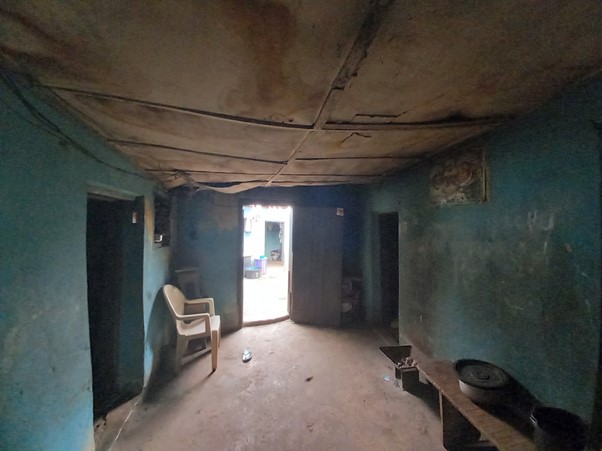
Like Shuaib, Garba Musa, who now travels the almost 40 kilometres distance between Sabo and Iroko daily to trade, lamented over the absence of government support.
Musa now lives with an old friend in a single room alongside four others. “Our people here give us food, and I wear my friend’s clothes,” he said.
When contacted, Taiwo Adisa, the Chief Press Secretary to Seyi Makinde, the state governor, expressed worry about how people who have refused to return to Shasha expect the government’s palliatives to reach them.
“So if the government has palliatives, we should send to their new locations or what?” he asked rhetorically.
Speaking further, Adisa told HumAngle that those “around the market have already benefited from the initial support given by Nigerian Governors Forum and Oyo State Government.”
He also noted that the Governor had promised to set up an investigative panel to dig into the roots of the crisis, fish out perpetrators of arson and other crimes and provide support for those who suffered losses.
“It is the committee that will recommend the holistic support from the government,” the Governor’s spokesperson added.
Iroko Ultra Modern Market Stirs Controversy
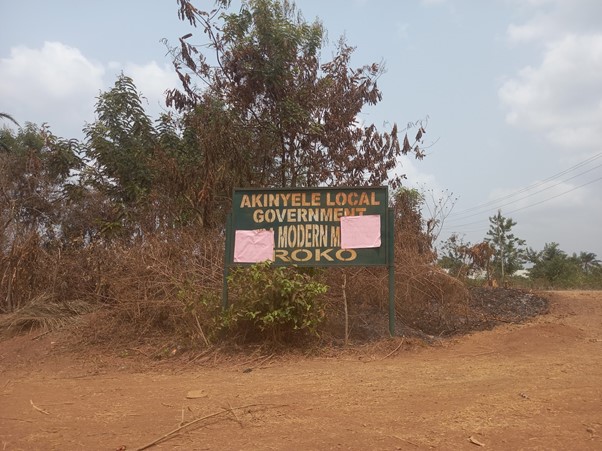
HumAngle gathered that when the Hausa and Yoruba traders, who vowed never to return to Shasha in the aftermath of the clash, arrived at Iroko, they traded at an uncompleted ultra-modern market.
According to multiple traders who spoke with HumAngle, the market had been proposed as the new site of the Shasha market several years ago.
However, on Feb. 23, Gov. Makinde ordered the Iroko market’s indefinite closure because “the promoters of that market were actually part of the people causing confusion and causing problems at Shasha market.”
“We will take a long term view of the Iroko market,” the governor added while issuing the directive.
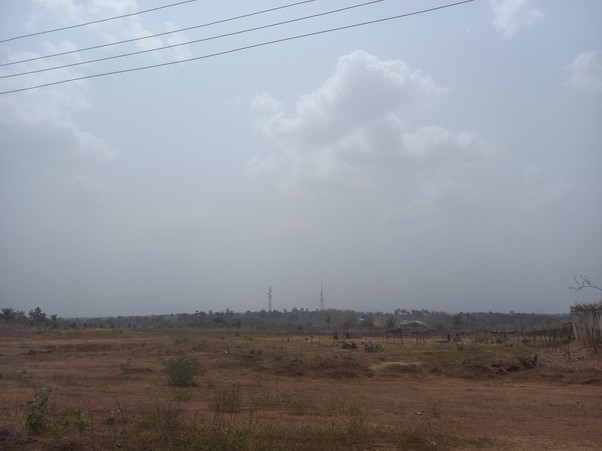
“As you can see, we are selling our goods by the roadside, which is very risky. Trailers are crossing, and we don’t have any other place to go rather than here,” he said.
He noted that they were ready to use their money to complete the project according to the government’s proposed design.
“What brought this crisis? We don’t want any form of that to happen again. That’s why we want to stay here in Iroko,” he said.
He added that even though government and top security officials have attempted to persuade them to return to Shasha, these efforts have proved futile because they “don’t want to go back there because of fear and here (Iroko) is safer.”
Like Aliyu, Azeez Wasiu, a Yoruba trader who has relocated to Iroko, told HumAngle that he also has no plan to return to Shasha. According to him, a move away from the Shasha market has been in the pipeline for a long time, but the clash was just the tipping point.
Speaking further, he noted that steps have begun to pressure the government to reopen the Iroko market.
Meanwhile, when probed for more insight, the Governor’s spokesperson told HumAngle that the market would remain closed “until the government finds another reason to do otherwise.”
Support Our Journalism
There are millions of ordinary people affected by conflict in Africa whose stories are missing in the mainstream media. HumAngle is determined to tell those challenging and under-reported stories, hoping that the people impacted by these conflicts will find the safety and security they deserve.
To ensure that we continue to provide public service coverage, we have a small favour to ask you. We want you to be part of our journalistic endeavour by contributing a token to us.
Your donation will further promote a robust, free, and independent media.
Donate HereStay Closer To The Stories That Matter




